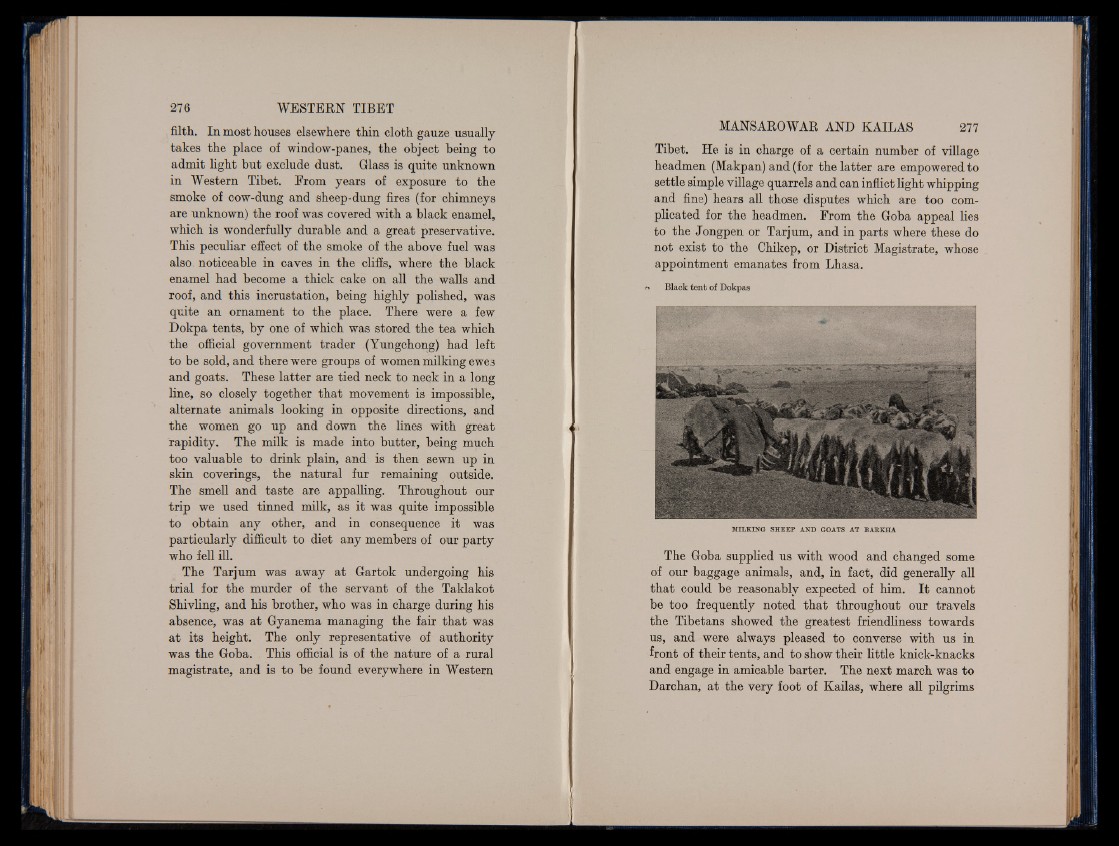
filth. In most houses elsewhere thin cloth gauze usually
takes the place of window-panes, the object being to
admit light but exclude dust. Glass is quite unknown
in Western Tibet. Erom years of exposure to the
smoke of cow-dung and sheep-dung fires (for chimneys
are unknown) the roof was covered with a black enamel,
which is wonderfully durable and a great preservative.
This peculiar effect of the smoke of the above fuel was
also noticeable in caves in the cliffs, where the black
enamel had become a thick cake on all the walls and
roof, and this incrustation, being highly polished, was
quite an ornament to the place. There were a few
Dokpa tents, by one of which was stored the tea which
the official government trader (Yungchong) had left
to be sold, and there were groups of women milking ewe3
and goats. These latter are tied neck to neck in a long
fine, so closely together that movement is impossible,
alternate animals looking in opposite directions, and
the women go up and down the lines with great
rapidity. The milk is made into butter, being much
too valuable to drink plain, and is then sewn up in
skin coverings, the natural fur remaining outside.
The smell and taste are appalling. Throughout our
trip we used tinned milk, as it was quite impossible
to obtain any other, and in consequence it was
particularly difficult to diet any members of our party
who fell ill.
The Tarjum was away at Gartok undergoing his
trial for the murder of the servant of the Taklakot
Shivling, and his brother, who was in charge during his
absence, was at Gyanema managing the fair that was
at its height. The only representative of authority
was the Goba. This official is of the nature of a rural
magistrate, and is to be found everywhere in Western
Tibet. He is in charge of a certain number of village
headmen (Makpan) and (for the latter are empowered to
settle simple village quarrels and can inflict light whipping
and fine) hears all those disputes which are too complicated
for the headmen. From the Goba appeal lies
to the Jongpen or Tarjum, and in parts where these do
not exist to the Chikep, or District Magistrate, whose
appointment emanates from Lhasa.
r> Black tent of Dokpas
MILKING SHEEP AND GOATS AT BARKHA
The Goba supplied us with wood and changed some
of our baggage animals, and, in fact, did generally all
that could be reasonably expected of him. I t cannot
be too frequently noted that throughout our travels
the Tibetans showed the greatest friendliness towards
us, and were always pleased to converse with us in
front of their tents, and to show their little knick-knacks
and engage in amicable barter. The next march was to
Darchan, at the very foot of Kailas, where all pilgrims